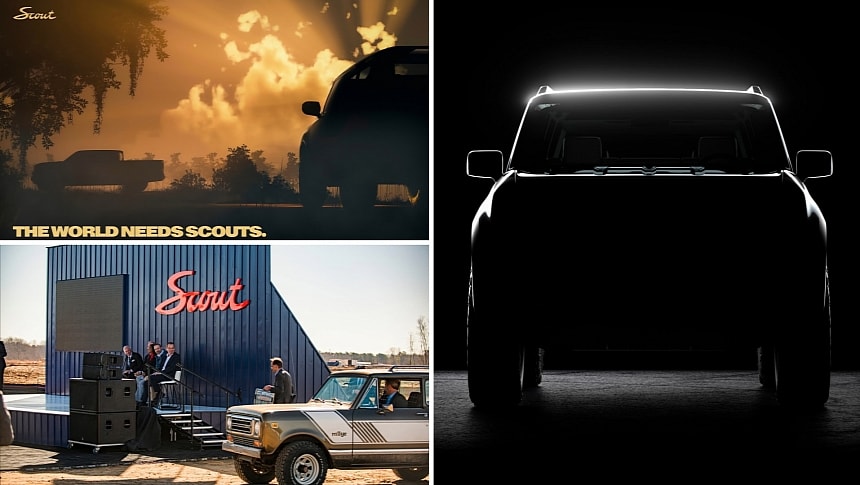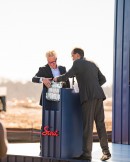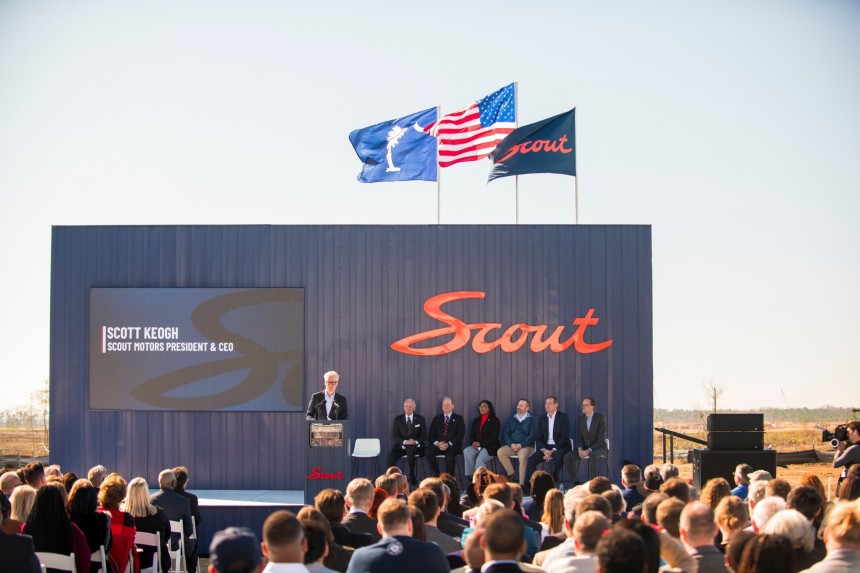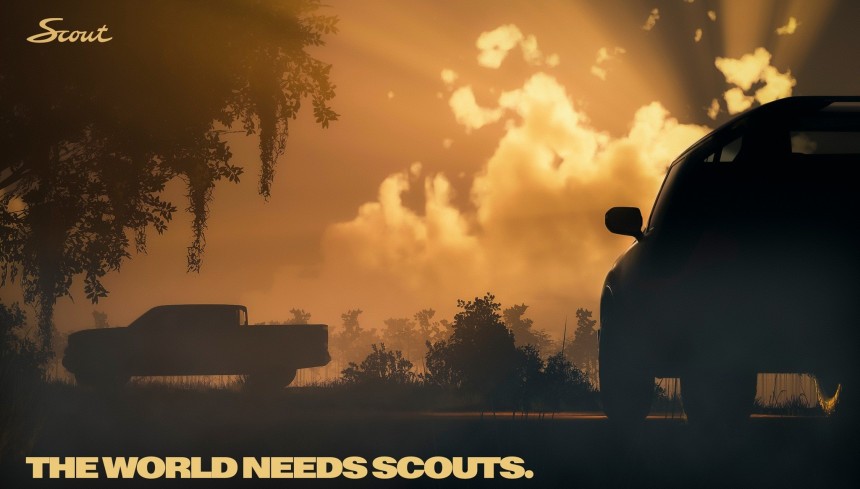Scout Motors opened a new chapter in its storied history with the groundbreaking ceremony for its South Carolina factory. The all-electric brand in Volkswagen Group's portfolio wants to start production of the first Scout EVs in 2026 after unveiling the prototype later this year. According to the company's CEO, Scott Keogh, these will be robust off-roaders with a mechanical feel and "chunky buttons."
Two years ago, Volkswagen confirmed rumors that it would revive the Scout brand in the US. The German carmaker acquired the rights to use the legendary name with the acquisition of Navistar International in 2020. From the very beginning, Volkswagen made it clear that it wanted a new company with a startup strategy and almost no connection to Volkswagen's way of doing things. This was great, considering how bad Volkswagen was at understanding the American market.
The initial plans were to establish a dedicated car factory in the US to produce all-electric SUVs and trucks that have nothing to do with existing Volkswagen models. Not that Volkswagen has any rugged EV platform in its portfolio. Still, after Volkswagen got into financial troubles, the German bosses reconsidered the strategy and hinted at manufacturing Scout EVs under contract with either Magna or Foxconn. Thankfully, things were settled, and Volkswagen followed the original plans. Soon after, Scout Motors got its CEO Scott Keogh, former Volkswagen of America boss, and unveiled plans to build a factory in South Carolina.
As time passed, it was clear that Scout Motors had better chances to conquer a piece of the US market than Volkswagen. The company started from a clean sheet as a startup with no overhangs, and it has a great heritage to build upon, as Scout basically invented the SUVs in the 1960s. The only question that remained was whether Volkswagen would allow the young company to reinvent itself without micromanaging it in a pure German fashion.
Judging by how quickly things have moved so far, it appears that Scout Motors has enough leeway to act like a true startup. A year ago, it announced its first production facility in South Carolina after securing over $1.3 billion in state incentives. The plant's capacity would reach 250,000 units per year with production in full swing, and the first vehicles would roll off the production line in 2026. Scout Motors wasted no time and has just broken ground on the new Blythewood, South Carolina factory.
The first model to be unveiled later this year will be a rugged all-electric SUV. The pickup truck based on the same platform will follow six months later. Talking about the design, Keogh said that Scout trucks will not care much about aerodynamics and instead will offer a trusted truck design with hard angles and corners. Scout trucks will also have "real door handles" instead of recessed self-presenting handles like other EVs. "The car will stand up right," he said, "It's not a jelly bean." Keogh revealed that the Scout trucks will keep the iconic fold-down windshield of the original Scout models.
Scout electric trucks will be less of computers on wheels like other electric vehicles and more like classic off-roaders. "We do believe in mechanical," Keogh explained, "and we believe in chunky buttons." Considering the current trend of eliminating the buttons and hiding everything behind folding menus on the infotainment screen, this is refreshing. However, it's also a decision stemming from Volkswagen's failure with software controls in its EVs. Hopefully, the startup will get the balance right and give everyone the best combination of software and hardware.
Keogh gave the Ford Bronco, Land Rover Defender, and Jeep Wrangler as examples. However, the design sketches and teaser images show that the real inspiration for Scout EVs was Rivian R1T and R1S. Since Keogh also says the final design of Scout's first two models is almost complete, we can say Rivian will have a powerful competitor in the next couple of years. With engineering not being far behind the design, it should be feasible to see production starting in 2026, as planned.
Of course, there are still many things for Scout Motors to sort out by then. One of them is setting up the battery supply chain. Keogh told journalists that batteries used by the US-made Volkswagen ID.4 EVs won't work for Scout vehicles. Instead, Volkswagen Group intends to leverage its in-house battery subsidiary PowerCo, which is also building a North American factory in Ontario.
The initial plans were to establish a dedicated car factory in the US to produce all-electric SUVs and trucks that have nothing to do with existing Volkswagen models. Not that Volkswagen has any rugged EV platform in its portfolio. Still, after Volkswagen got into financial troubles, the German bosses reconsidered the strategy and hinted at manufacturing Scout EVs under contract with either Magna or Foxconn. Thankfully, things were settled, and Volkswagen followed the original plans. Soon after, Scout Motors got its CEO Scott Keogh, former Volkswagen of America boss, and unveiled plans to build a factory in South Carolina.
As time passed, it was clear that Scout Motors had better chances to conquer a piece of the US market than Volkswagen. The company started from a clean sheet as a startup with no overhangs, and it has a great heritage to build upon, as Scout basically invented the SUVs in the 1960s. The only question that remained was whether Volkswagen would allow the young company to reinvent itself without micromanaging it in a pure German fashion.
Scout Motors broke ground of its new US factory in South Carolina
The groundbreaking ceremony differed from what we usually see at these events, almost like a ritual. Scout organized a cross-country rally of classic Scout off-roaders to transport a brick from the original Scout plant in Fort Wayne, Indiana, making it the new factory's foundation stone. A nice throwback to the great Scout history, although Scott Keogh assured us that he doesn't intend to offer retro EVs. "We didn't want to say to America, 'It's the '70s again,'" Keogh told media. "It's the 21st century and of course, it's a modern car."The first model to be unveiled later this year will be a rugged all-electric SUV. The pickup truck based on the same platform will follow six months later. Talking about the design, Keogh said that Scout trucks will not care much about aerodynamics and instead will offer a trusted truck design with hard angles and corners. Scout trucks will also have "real door handles" instead of recessed self-presenting handles like other EVs. "The car will stand up right," he said, "It's not a jelly bean." Keogh revealed that the Scout trucks will keep the iconic fold-down windshield of the original Scout models.
Keogh gave the Ford Bronco, Land Rover Defender, and Jeep Wrangler as examples. However, the design sketches and teaser images show that the real inspiration for Scout EVs was Rivian R1T and R1S. Since Keogh also says the final design of Scout's first two models is almost complete, we can say Rivian will have a powerful competitor in the next couple of years. With engineering not being far behind the design, it should be feasible to see production starting in 2026, as planned.
Of course, there are still many things for Scout Motors to sort out by then. One of them is setting up the battery supply chain. Keogh told journalists that batteries used by the US-made Volkswagen ID.4 EVs won't work for Scout vehicles. Instead, Volkswagen Group intends to leverage its in-house battery subsidiary PowerCo, which is also building a North American factory in Ontario.










